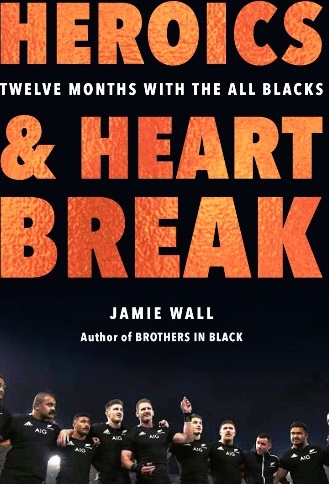Heroics & Heartbreak
027th October 2018. It seems like a lifetime ago. The All Blacks are playing Australia at Yokohama International Stadium in the first match of their end of year tour. It’s also the starting point for Jamie Wall’s new book ‘Heroics & Heartbreak’, a journey which will end back in Japan almost exactly 12 months later when the All Blacks defeat Wales in the Rugby World Cup’s bronze medal match.
Published just a few months after his first book, ‘Brothers in Black’, Wall’s story follows the team as they attempt to win an unprecedented third title in a row. Structured via short, punchy chapters in three parts;
A Year Out
The Lead-Up
The Cup
We get to understand what it’s like to be part of the media bubble that surrounds the team and it’s far from glamourous. The hours are long and the travel is extensive. The day to day routine can be draining and when it comes to press conferences, they are usually mundane and predictable. But Wall’s ability to make astute observations and tell entertaining anecdotes, whilst weaving in wider rugby and social issues, makes this a book well worth investing time in.
Early on, we read about the launch of the All Blacks jersey in Japan a few days after that victory against the Wallabies. This is a big deal, with numerous social media influencers without any day to day interest in rugby sitting in the front rows, phones at the ready to post comments and photos to their numerous followers – it brings home how different a launch like this is overseas; it’s big business and very slick and you are reminded the All Blacks are no longer the exclusive property of the New Zealand public.
The book covers all the main events you would expect. They are presented in the context of the moment they happen, like a diary entry, and that gives the reader the opportunity to reflect on their own thoughts at the time. The injuries to Damian McKenzie, Ben Smith and Brodie Retallick. The naming of the first All Blacks squad of 2019. The heavy loss to the Wallabies in Perth. The dropping of Owen Franks, Rieko Ioane and Ben Smith that followed. We get a feeling for Steve Hansen’s prickly nature when he’s in front of the media, Kieran Read’s straight bat approach, whether at the Captain’s run or the post-match media conference. During the Cup itself, you understand the challenge of covering the tournament due to the sheer scale of Japan, as well as the fan experience and then of course there’s Typhoon Hagibis.
Towards the end of the book, Wall reflects on the time he went to Eden Park in 1999 to watch his beloved province Wellington play in the NPC first-division final. You feel his passion from back then, the real excitement to be there and he said at that time:
‘I’ll follow this team to the ends of the earth, even if they never win anything.’
Fast forward 20 years to the night of the Rugby World Cup semi-final between the All Blacks and England and he admits he has completely forgotten that Wellington had made it to the Mitre 10 Cup final against Tasman, which is being played just a few hours before. It brings into perspective just how much the focus and landscape of rugby in New Zealand has changed over that period; that focus is now all about the All Blacks, and while they were top of the pile that was fine. Now they are not, the participation and engagement challenges for the national game are far more visible and urgent.
Over Christmas, this was a book I was really looking forward to sitting down and reading. Once I started it ticked all the boxes and it was difficult to put down, which is always a good sign. Informative, thought-provoking and funny, it’s highly recommended.
Follow Aiden on Twitter

